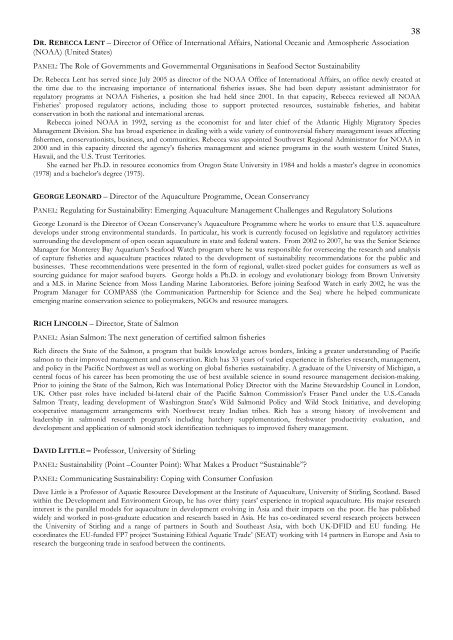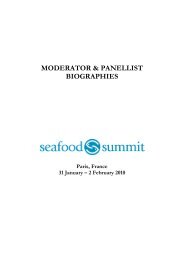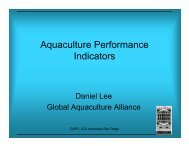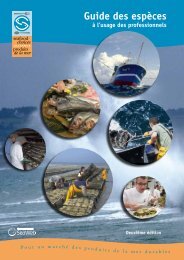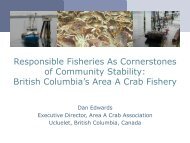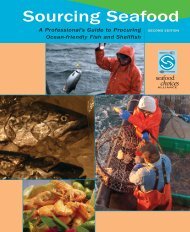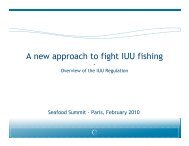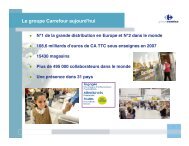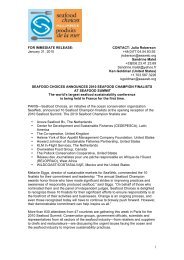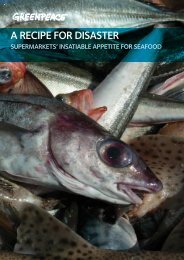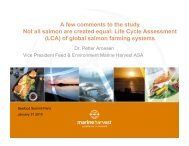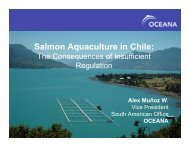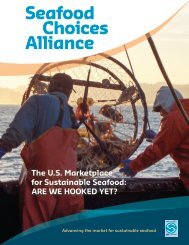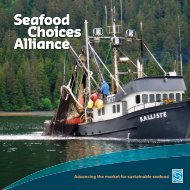Paris and Seafood Summit 2010! - Seafood Choices Alliance
Paris and Seafood Summit 2010! - Seafood Choices Alliance
Paris and Seafood Summit 2010! - Seafood Choices Alliance
Create successful ePaper yourself
Turn your PDF publications into a flip-book with our unique Google optimized e-Paper software.
38<br />
DR. REBECCA LENT – Director of Office of International Affairs, National Oceanic <strong>and</strong> Atmospheric Association<br />
(NOAA) (United States)<br />
PANEL: The Role of Governments <strong>and</strong> Governmental Organisations in <strong>Seafood</strong> Sector Sustainability<br />
Dr. Rebecca Lent has served since July 2005 as director of the NOAA Office of International Affairs, an office newly created at<br />
the time due to the increasing importance of international fisheries issues. She had been deputy assistant administrator for<br />
regulatory programs at NOAA Fisheries, a position she had held since 2001. In that capacity, Rebecca reviewed all NOAA<br />
Fisheries’ proposed regulatory actions, including those to support protected resources, sustainable fisheries, <strong>and</strong> habitat<br />
conservation in both the national <strong>and</strong> international arenas.<br />
Rebecca joined NOAA in 1992, serving as the economist for <strong>and</strong> later chief of the Atlantic Highly Migratory Species<br />
Management Division. She has broad experience in dealing with a wide variety of controversial fishery management issues affecting<br />
fishermen, conservationists, business, <strong>and</strong> communities. Rebecca was appointed Southwest Regional Administrator for NOAA in<br />
2000 <strong>and</strong> in this capacity directed the agency’s fisheries management <strong>and</strong> science programs in the south western United States,<br />
Hawaii, <strong>and</strong> the U.S. Trust Territories.<br />
She earned her Ph.D. in resource economics from Oregon State University in 1984 <strong>and</strong> holds a master’s degree in economics<br />
(1978) <strong>and</strong> a bachelor’s degree (1975).<br />
GEORGE LEONARD – Director of the Aquaculture Programme, Ocean Conservancy<br />
PANEL: Regulating for Sustainability: Emerging Aquaculture Management Challenges <strong>and</strong> Regulatory Solutions<br />
George Leonard is the Director of Ocean Conservancy’s Aquaculture Programme where he works to ensure that U.S. aquaculture<br />
develops under strong environmental st<strong>and</strong>ards. In particular, his work is currently focused on legislative <strong>and</strong> regulatory activities<br />
surrounding the development of open ocean aquaculture in state <strong>and</strong> federal waters. From 2002 to 2007, he was the Senior Science<br />
Manager for Monterey Bay Aquarium’s <strong>Seafood</strong> Watch program where he was responsible for overseeing the research <strong>and</strong> analysis<br />
of capture fisheries <strong>and</strong> aquaculture practices related to the development of sustainability recommendations for the public <strong>and</strong><br />
businesses. These recommendations were presented in the form of regional, wallet-sized pocket guides for consumers as well as<br />
sourcing guidance for major seafood buyers. George holds a Ph.D. in ecology <strong>and</strong> evolutionary biology from Brown University<br />
<strong>and</strong> a M.S. in Marine Science from Moss L<strong>and</strong>ing Marine Laboratories. Before joining <strong>Seafood</strong> Watch in early 2002, he was the<br />
Program Manager for COMPASS (the Communication Partnership for Science <strong>and</strong> the Sea) where he helped communicate<br />
emerging marine conservation science to policymakers, NGOs <strong>and</strong> resource managers.<br />
RICH LINCOLN – Director, State of Salmon<br />
PANEL: Asian Salmon: The next generation of certified salmon fisheries<br />
Rich directs the State of the Salmon, a program that builds knowledge across borders, linking a greater underst<strong>and</strong>ing of Pacific<br />
salmon to their improved management <strong>and</strong> conservation. Rich has 33 years of varied experience in fisheries research, management,<br />
<strong>and</strong> policy in the Pacific Northwest as well as working on global fisheries sustainability. A graduate of the University of Michigan, a<br />
central focus of his career has been promoting the use of best available science in sound resource management decision-making.<br />
Prior to joining the State of the Salmon, Rich was International Policy Director with the Marine Stewardship Council in London,<br />
UK. Other past roles have included bi-lateral chair of the Pacific Salmon Commission's Fraser Panel under the U.S.-Canada<br />
Salmon Treaty, leading development of Washington State's Wild Salmonid Policy <strong>and</strong> Wild Stock Initiative, <strong>and</strong> developing<br />
cooperative management arrangements with Northwest treaty Indian tribes. Rich has a strong history of involvement <strong>and</strong><br />
leadership in salmonid research program's including hatchery supplementation, freshwater productivity evaluation, <strong>and</strong><br />
development <strong>and</strong> application of salmonid stock identification techniques to improved fishery management.<br />
DAVID LITTLE – Professor, University of Stirling<br />
PANEL: Sustainability (Point –Counter Point): What Makes a Product “Sustainable”?<br />
PANEL: Communicating Sustainability: Coping with Consumer Confusion<br />
Dave Little is a Professor of Aquatic Resource Development at the Institute of Aquaculture, University of Stirling, Scotl<strong>and</strong>. Based<br />
within the Development <strong>and</strong> Environment Group, he has over thirty years’ experience in tropical aquaculture. His major research<br />
interest is the parallel models for aquaculture in development evolving in Asia <strong>and</strong> their impacts on the poor. He has published<br />
widely <strong>and</strong> worked in post-graduate education <strong>and</strong> research based in Asia. He has co-ordinated several research projects between<br />
the University of Stirling <strong>and</strong> a range of partners in South <strong>and</strong> Southeast Asia, with both UK-DFID <strong>and</strong> EU funding. He<br />
coordinates the EU-funded FP7 project ‘Sustaining Ethical Aquatic Trade’ (SEAT) working with 14 partners in Europe <strong>and</strong> Asia to<br />
research the burgeoning trade in seafood between the continents.


